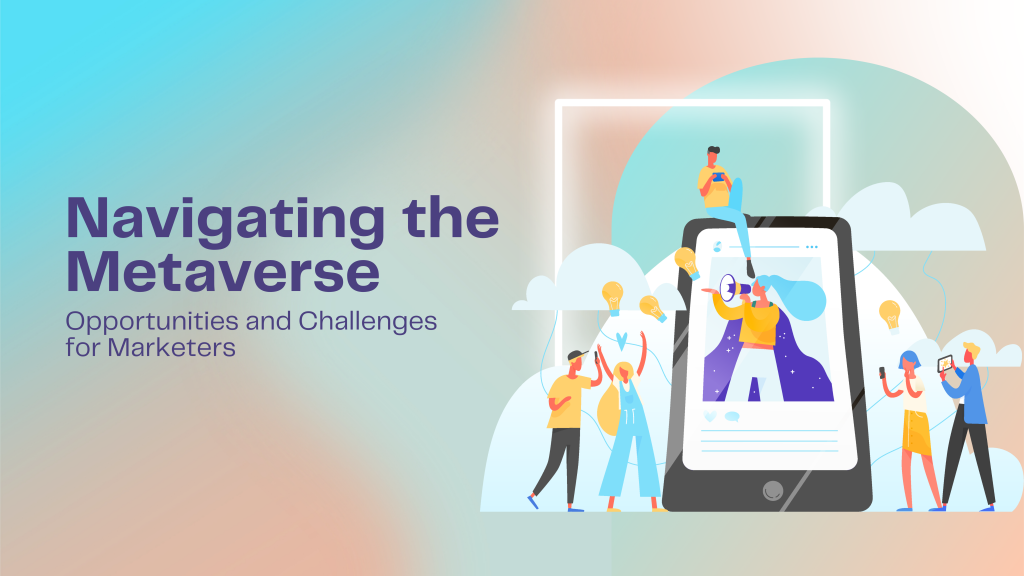Navigating the Metaverse : Opportunities and Challenges For Marketers

Welcome to the Metaverse, where virtual reality meets real-world marketing! As technology continues to advance at a rapid pace, marketers are faced with new opportunities and challenges in navigating this digital landscape. In this blog post, we will explore how brands can leverage the Metaverse to connect with consumers in innovative ways, while also addressing the potential pitfalls that come with venturing into this uncharted territory. So buckle up and get ready to dive headfirst into a world of endless possibilities – it’s time to navigate the Metaverse!
Introduction To The Metaverse And Its Potential Impact On Marketing
The concept of the Metaverse has been around for decades, but it is now gaining more attention as technologies such as virtual and augmented reality (VR/AR), artificial intelligence (AI), and blockchain continue to advance. The Metaverse can be described as a collective virtual space that incorporates elements of the physical world, allowing users to interact with one another in real-time through avatars and digital representations.
As this virtual world becomes increasingly immersive and realistic, many experts predict that it will have a profound impact on various industries, including marketing. In fact, some even believe that the Metaverse could revolutionize the way businesses connect with consumers.
One of the key potential impacts of the Metaverse on marketing is its ability to create highly personalized and interactive experiences for consumers. With VR/AR technology, brands can transport their customers into virtual worlds where they can try out products or services before making a purchase decision. This not only enhances the overall customer experience but also allows marketers to gather valuable data and insights about consumer behavior within these immersive environments.
What Is The Metaverse? Explaining The Concept And Its Evolution
The Metaverse is a term that has been gaining traction in recent years, but what exactly does it mean? In simple terms, the Metaverse can be described as an immersive and interactive virtual world that combines elements of augmented reality (AR), virtual reality (VR), and the internet. It is a shared space where users can create, interact, and conduct business in a digital environment.
The concept of the Metaverse has been around for decades, with its roots traced back to science fiction novels and movies. However, it was not until the rise of advanced technology such as VR headsets, haptic gloves, and motion tracking devices that the idea became more feasible. The term was coined by author Neal Stephenson in his 1992 novel “Snow Crash,” where he described a virtual world called the Metaverse that people could access through their computers.
Over time, the idea of the Metaverse has evolved from being just a work of science fiction to becoming a potential future reality. With advancements in technology and increased connectivity globally, experts believe that we are on the cusp of experiencing an all-encompassing Metaverse.
Opportunities For Marketers In The Metaverse: Virtual Events, Immersive Advertising, And More
As the Metaverse continues to expand and evolve, it presents a multitude of opportunities for marketers to connect with their target audience in new and innovative ways. In this section, we will explore some of the most promising opportunities for marketers in the Metaverse, including virtual events, immersive advertising, and more.
Virtual events have quickly become a popular way for brands to engage with consumers in the Metaverse. These events offer a unique opportunity for marketers to create immersive experiences that can reach a global audience without the constraints of physical space or location. With virtual events, marketers can showcase their products or services in interactive and visually stunning environments, creating an unforgettable experience for attendees.
One example of successful virtual event marketing is Fortnite’s collaboration with Travis Scott in 2020, where players were able to attend a live music concert within the game. The event attracted over 12 million players and generated extensive media coverage, showcasing the potential reach and impact of virtual events as a marketing tool.

Challenges Faced By Marketers In The Metaverse: Privacy Concerns, Creating A Seamless Experience, And More
The concept of the Metaverse has captured the attention of marketers around the world, promising endless possibilities for engaging and connecting with consumers in a virtual realm. However, as with any new technology or platform, there are also challenges that must be addressed for successful marketing in the Metaverse.
One major challenge that marketers face in the Metaverse is privacy concerns. As more and more personal data is collected and shared within this digital space, consumers have become increasingly aware of their right to privacy. This has led to stricter regulations such as GDPR and CCPA, which require businesses to obtain explicit consent from users before collecting their data. In a world where every action can be tracked and recorded, marketers must navigate this delicate balance between gathering valuable consumer insights while also respecting their privacy.
Successful Examples Of Brands Using The Metaverse For Marketing Purposes
The Metaverse, a virtual world where users can interact and engage with each other in a simulated environment, has become increasingly popular among brands looking to market their products or services. With the rise of virtual reality technology and the growing number of users in the Metaverse, it presents a unique opportunity for marketers to reach a new audience and create immersive experiences.
One successful example of a brand utilizing the Metaverse for marketing purposes is Nike. In 2019, Nike partnered with Fortnite, one of the most popular online games, to launch limited edition virtual sneakers that players could purchase using in-game currency. This collaboration not only generated buzz and excitement among gamers but also allowed Nike to tap into a new market and showcase their brand in an innovative way.
Another example is Coca-Cola’s partnership with Decentral and, a blockchain-based virtual platform. Coca-Cola created a branded virtual space called “Coca-Cola Tresor” within Decentraland where users could explore and interact with branded content such as billboards and vending machines. This allowed Coca-Cola to connect with their target audience in a fun and engaging way while also promoting their brand.
Tips For Navigating The Metaverse As A Marketer: Understanding The Target Audience, Utilizing New Technologies
As the Metaverse continues to expand and evolve, marketers are presented with a new realm of opportunities to connect with their target audience. However, navigating this virtual world can also be daunting and overwhelming for those who are unfamiliar with its unique landscape. In this section, we will discuss some helpful tips for marketers looking to make their mark in the Metaverse.
Understanding the Target Audience:
The first step in successfully marketing in the Metaverse is understanding your target audience. This virtual world is home to a diverse range of users from different backgrounds, ages, and interests. It is crucial to research and analyze your target audience’s preferences, behaviors, and motivations within the Metaverse.
One way to gain insight into your target audience is by immersing yourself in the virtual spaces they frequent. This will not only give you firsthand experience of how they interact but also allow you to observe their preferences and behaviors. Additionally, conducting surveys or focus groups within the Metaverse can provide valuable data on your target audience’s needs and wants.
Utilizing New Technologies:
The Metaverse is constantly evolving with new technologies being introduced regularly. As a marketer, it is essential to stay updated on these advancements and incorporate them into your strategies.
One key technology that has been gaining popularity in the Metaverse is Virtual Reality (VR). With VR headsets becoming more accessible and affordable, incorporating this technology into marketing campaigns can provide an immersive experience for users. For example, creating a VR showroom for products or hosting events in virtual reality can help create a stronger connection between brand and consumer.
Conclusion
As we continue to see the rise of the metaverse and its potential impact on our daily lives, it is essential for marketers to understand and adapt to this new digital space. By following these tips and keeping an open mind, businesses can capitalize on the opportunities presented by the metaverse while also navigating any challenges that may arise. It is an exciting time for marketing, and embracing the metaverse could lead to innovative strategies and successful campaigns in this ever-evolving landscape. So let’s embrace the possibilities of the metaverse together!



Comments
Post a Comment